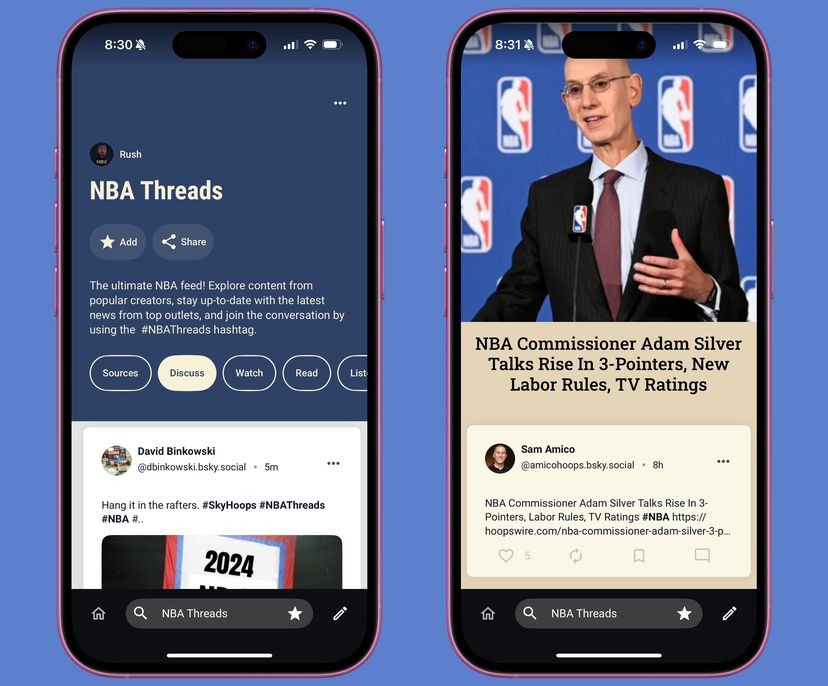Mike McCue, the CEO of Flipboard and a long-time internet entrepreneur dating back to the Netscape era, is a staunch advocate of the “fediverse.” While he doesn’t favor the term, preferring to call it “the social web,” McCue firmly believes this decentralized and interconnected social networking ecosystem—exemplified by platforms like Mastodon and Bluesky—is the internet’s inevitable future.
For over a year, McCue and his team have been reimagining Flipboard to align with the social web’s decentralized principles. Once complete, Flipboard will serve as a platform to seamlessly discover and consume content from across the internet in a decentralized manner. While this transformation is progressing steadily, Flipboard isn’t positioned to dominate the fediverse like Threads could if Meta fully embraces decentralization.
Meanwhile, McCue’s team has been working on a more ambitious project: a new app called Surf, described as “the world’s first browser for the social web.” McCue first introduced this idea over a year ago, sharing early mock-ups and conceptual slides. Since then, Surf has been in beta testing, and a public beta launches today. Initially, access will be limited to curators and creators to ensure the app offers rich content when it becomes widely available.
Surf’s foundational concept is to navigate a decentralized social world centered around feeds rather than traditional websites. McCue explains, “You won’t put in ‘theverge.com’ to visit The Verge’s website; instead, you’ll search for ‘The Verge’ to access its ActivityPub feed.” In this new paradigm, feeds dominate social interaction—your Threads timeline, Bluesky starter packs, and creator updates are all variations of feeds.

The app’s primary function is to help users discover and interact with these feeds. Surf can access three types of feeds: ActivityPub feeds (such as Mastodon, Threads, and Pixelfed), AT Protocol feeds (like Bluesky), and RSS feeds. Users can search for feeds by topics, publishers, or creators, combine multiple feeds into curated collections, and share those collections for others to build upon. While the concept may sound complex, the app offers a clean, vertically scrolling interface reminiscent of a cross between a Twitter timeline and Apple News.
Feeds in Surf can aggregate diverse content, from news articles to videos and podcasts. This versatility poses a significant design challenge, requiring Surf to function effectively as a social network, news aggregator, video platform, and podcast player—all within a single app. While this ambitious goal is still a work in progress, Surf already demonstrates potential. For instance, users can create a personalized feed combining favorite blogs, podcasts, YouTube channels, and social posts. The app also allows filtering, letting users view only videos or queue up podcasts within a feed.
Though Surf isn’t yet fully optimized for all these use cases, it’s already a versatile tool for consuming various types of media. Videos, for example, are presented in a TikTok-like endless scroll, making it engaging to explore YouTube content. News links are displayed with prominent images and headlines, offering an experience akin to a traditional news app. Unlike dense timelines found on platforms like Twitter, Surf leans towards Flipboard’s magazine-style interface, prioritizing design and readability.
However, integrating multiple platforms into one app brings challenges. Search results can be messy; for instance, multiple profiles with the same name might appear, making it unclear which one to follow. Surf also aims to facilitate interaction across platforms, but this feature currently works best with Mastodon. Interactions on other platforms are limited or nonfunctional, making Surf more of a content consumption tool than a fully interactive social app for now.
McCue envisions the social web as the dawn of a new internet era, using analogies from the early web to describe its potential. He likens the current stage to AOL’s “walled garden” of innovation, while Surf aspires to be like Yahoo in its prime—a hub for curated feeds. He also envisions paid feeds as a revenue stream for creators, publishers, and curators, along with customizable feed designs resembling traditional homepages.
Despite the vast amount of work ahead—including convincing platforms and publishers to adopt decentralized protocols—McCue remains unwavering in his optimism. He acknowledges the fragmented nature of the social web but sees Surf as the solution to unify it. For instance, he highlights a custom basketball feed created by David Rushing, a key figure in NBA discussions on Threads. With Surf, this feed aggregates content tagged with #nbathreads across platforms like Bluesky, Mastodon, Threads, and Flipboard, encompassing everything from podcasts to YouTube videos. Rushing can further refine the feed by filtering out unwanted topics, ensuring a tailored experience.
As McCue scrolls through this basketball content, he encapsulates his vision for Surf and the social web. “Ultimately, you won’t care whether something is on Threads or Bluesky,” he says. “Just like email works regardless of whether you use Gmail, the social web will transcend individual platforms.” McCue sees diverse communities thriving across multiple apps, united by shared interests. For him, the challenge isn’t competition but connection—how to bring everyone together in a decentralized but cohesive online world. Surf might just be the tool to achieve that vision.
